S. Evan Townsend's Blog, page 122
August 25, 2013
Editing Tips
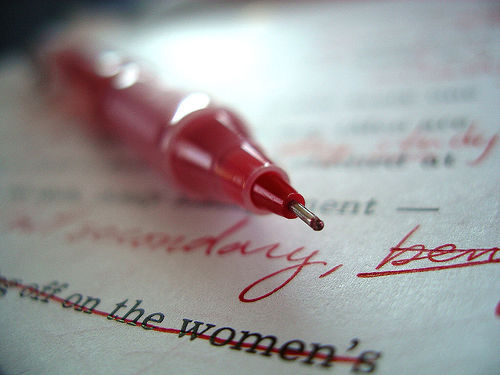 I love to write. But I'm not so enamored with editing. Writing is fun; editing is work. I don't know any writers who really enjoy editing but it is a necessary part of writing. The other problem is that while I'm an okay editor, I'm a lousy proofreader (yes, there's a difference).
I love to write. But I'm not so enamored with editing. Writing is fun; editing is work. I don't know any writers who really enjoy editing but it is a necessary part of writing. The other problem is that while I'm an okay editor, I'm a lousy proofreader (yes, there's a difference).I'm a whole-word reader. I see a word and see the word I think it should be. Now while technology helps, there's lots of things spell-checkers won't catch (for instance, "form" instead of from"). And my eye will see "form" as "from" if that's the word I think should be there. That's why I'm a lousy proofreader. If you're a regular reader of this blog, you've seen how I miss typos a lot since I'm the only one who proofreads/edits it.
On editing, however, I'm good with grammar and sentence construction. I'm not great, but I'm good.
After you finish your first draft of anything you write, there are three things you need to do:
Re-writeProofreadEditYou can do those things somewhat simultaneously but they are slightly different things. Here's my definitions of the terms:
Re-write means looking for things that need changing in the writing, things to cut, better words/descriptions to use, maybe a section needs better explanation. It's improving the writing itself. The actual writer needs to do this.
Proofread is to look for simple errors like spelling/typos. This is the least technical aspect of manuscript improvement. Anyone who is good at spotting errors can do this. I'm not good at spotting errors.
Edit is to look for grammar mistakes, poor construction, wrong words, etc. The editor needs some modicum of writing ability. And it's best if at least one of the editors is not the writer.
Here are some editing/re-writing/proofreading tips I've learned over the years of writing:
After you write the first draft, let it sit and do not look at it for a while. I have a friend who says she lets her novel manuscripts sit at least a month before she goes back and looks at them. I call this process "festering" but really it's trying to look at it with fresh eyes. I find if I'm writing something long that by the time I finish, I can start re-writing the beginning pretty quickly because it's been a while since I wrote it. For short things, like my freelancing articles, I try to wait until at least overnight.Get everyone you can con into proofreading to proofread it. Also beta reading is a great idea. Print it out. Seeing it printed seems to fool the brain into this being something new. Or change the font on the screen before editing/proofreading.Read it out loud. This will make another part of your brain work and you'll see and hear things you didn't notice before.Have someone read it out loud to you. This is a great way to hear poor construction or word repetitions. Also they might spot some errors while reading.And let it sit some more. The longer it is, the longer it needs to fester.Writing the first draft is just the first part of writing. You may think (especially if you've done NaNoWriMo) that hammering out a 50,000-word manuscript is all you need to do. But that's just the start. Re-writing, proofreading, and editing complete the work. Yes, your publisher will edit it, too, but you want to send them the best manuscript you can. Editing costs them money so if you cost them less money, they'll be more likely to publish you again.
Published on August 25, 2013 14:23
August 22, 2013
Freelancing Tips
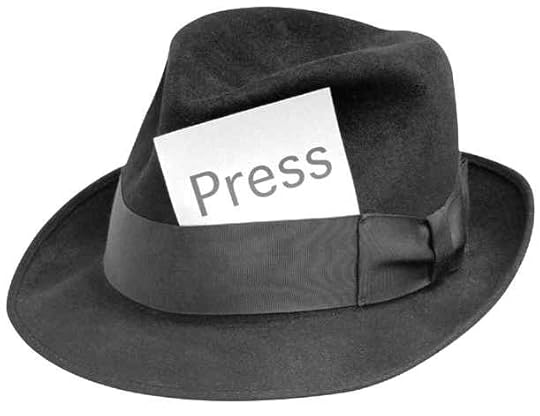 I do a fair bit of freelance writing. The hardest part was, at first, getting the jobs. I actually kind of conned an editor into taking a chance with me and she liked my work. I've been working with her ever since. Then others read what I wrote for her and (with a bit of my prodding) also took a chance on me. Now I have clippings to use to market myself to others. But in all cases, so far, all the freelance work I've gotten through "networking" (meeting and knowing people). My volunteer work in the community is a great way to meet and know people.
I do a fair bit of freelance writing. The hardest part was, at first, getting the jobs. I actually kind of conned an editor into taking a chance with me and she liked my work. I've been working with her ever since. Then others read what I wrote for her and (with a bit of my prodding) also took a chance on me. Now I have clippings to use to market myself to others. But in all cases, so far, all the freelance work I've gotten through "networking" (meeting and knowing people). My volunteer work in the community is a great way to meet and know people.But today I want to talk about a few things I've learned about freelancing. Often times you're interviewing someone (this is 99% of the freelance jobs I do) and then writing about them or something they are involved with. Here's some tips:
Start calling early. You never know how long it's going to take to get them to agree to an interview or when they will be available for an interview. The more time you have, the better. Sure, your deadline is two weeks away and an interview takes an hour. Start calling now! You might need all of that two weeks to line up the interview and get the story written.Be persistent. Call them daily, or twice daily, or whatever it takes to get them to talk to you. I had one subject who did not want to be interviewed and I just called twice a day every day (except Sunday) until he relented (he said, "You're persistent!"). A lot of subjects are flattered and want to be interviewed, but a few will not (I have had outright refusals).Give and get cell phone numbers. Give the subject your phone number in case they need to contact you. Get their phone number in case you need to contact them (you should have their number but it might a land line and a cell phone is much more likely to be answered).Be prepared. Research your subject, know as much as you can going into the interview. Even if you know some of the answers you want to ask them to either verify or say it in their own words. One subject I was going to interview (whom I was told never does interviews) I found out somehow was a University of Washington Huskies fan. I am too, so I wore a Huskies logo polo to the interview, which helped establish rapport.Write down your questions. After you've done your research, write down your questions. It's a lot easier to remember and think up questions beforehand. I type them up and print them out. You might want to look at questions you asked in earlier, similar interviews. If you're interviewing more than one person you might want to ask them the some of the same questions. Always write down your questions beforehand and take them with you. But don't be afraid to ask spontaneous questions if something needs following up, clarification, or you think of something on the spot.Be doubly prepared. Take at least 2 pens (pencils, whatever you write with) and plenty of paper (more than you think you'll need). If you type into a laptop during the interview, better have pen and paper backup. I've never used a tape recorder but if you do, have backup batteries, tapes, etc.Be early. I pad my travel time by 15 minutes, minimum. If you're on time . . . you're late. Be early. This also allows for getting lost, not finding the place, etc. Yes, I have sat in my car because I ended getting there really early.Be agreeable. If the subject is a hard core liberal and you're a conservative (or vise-versa) don't let your opinion of his politics come through. I have found I can get great quotes out of people by agreeing with them or saying something I think they believe (with farmers, I say something about how tough it is to be a farmer). All of the stories I've written so far are meant to be positive so there's no need to be confrontational.Thank them. When it's all done, thank them, give them your business card (you have one, don't you?), and thank them again. Let them know the expected publication date.Also, try to do the interview as far in advance of your deadline as possible. This will give you time to write the story, let it sit, then rewrite/proofread. Also, if the subject postpones you still have time to do the interview. I did (I will admit) one interview the day of my deadline and got the story in that evening but that was because the subject was traveling and wouldn't be back until that day.
And then, write the best story you can. Some subjects are great, great stories, great quotes. Some subjects are boring. No matter what, write the best dang story you can.
Published on August 22, 2013 09:32
August 19, 2013
Nova and Words
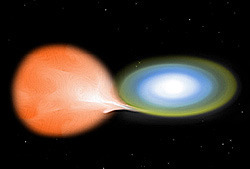 Last Wednesday (the 14th of August) an amateur Japanese astronomer discovered a nova. According to Space.com it's visible with binoculars or if conditions are right (clear, dark sky) the naked eye.
Last Wednesday (the 14th of August) an amateur Japanese astronomer discovered a nova. According to Space.com it's visible with binoculars or if conditions are right (clear, dark sky) the naked eye.A nova is when matter (mostly hydrogen) orbiting being sucked off a star into a near-by white dwarf starts to undergo fusion in a run-away reaction. These are not uncommon events (about 10 per year visible in our galaxy) but not often visible to the naked eye. There are star maps to locate it on this page.
The word "nova" for an explosion of stellar matter is interesting and part of how astronomy has evolved. The word "nova" is Latin for "new." When Tycho Brahe saw a nova in the 16th Century he thought it was a "new star" and called it a stella nova. And then when scientists found out what a "nova" was (i.e., not a new star) they still kept the old term.
Astronomy is full of these kinds of things. "Planet" comes from Greek for "wanderer" because, unlike the "fixed" stars (as the ancients believed), the planets wandered about the night sky. "Comet" comes from the Greek for "long hair." "Asteroid" comes from the Greek for "star like" because when they were first discovered no one knew what they were, just that they appeared star like in their telescopes.
I suspect other sciences have these linguistic quirks. Let me know in the comments if you know of any in your discipline in the comments.
Published on August 19, 2013 13:51
August 18, 2013
Movie Review: 42
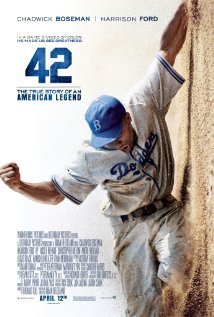 Last night I watched the movie about Jackie Robinson,
42
. I liked the movie a lot despite its flaws. And let me get this out of the way right now: early in the film a Negro League bus is shown going down a dirt road and a text at the bottom of the screen says something like "Interstate 24, Missouri." It's 1947 (or '46, I don't remember) and the Interstate Highway system came into being with the Federal Aid Highway Act of 1956 (nearly 10 years later) and even then, Interstate 24 does not enter or go through Missouri. This is the kind of historical detail mistake that I tried very hard not to have in my historical fantasy books.
Last night I watched the movie about Jackie Robinson,
42
. I liked the movie a lot despite its flaws. And let me get this out of the way right now: early in the film a Negro League bus is shown going down a dirt road and a text at the bottom of the screen says something like "Interstate 24, Missouri." It's 1947 (or '46, I don't remember) and the Interstate Highway system came into being with the Federal Aid Highway Act of 1956 (nearly 10 years later) and even then, Interstate 24 does not enter or go through Missouri. This is the kind of historical detail mistake that I tried very hard not to have in my historical fantasy books.Here's what I liked about his movie: it wasn't preachy or pandering. Jackie Robinson did not feel entitled or victimized because he is black. He knew he had to prove himself on the field and did not expect special treatment. In fact, the owner of the Brooklyn Dodgers, Branch Rickey (played very well by Harrison Ford) tell him he has to be "strong enough not to fight back" against the racism he will be subjected to. And I liked that Rickey, a devout Christian, is portrayed positively in a Hollywood movie. And I liked that Rickey's motivation in bringing in Robinson was not out of sympathy for Robinson, but because it was 1) the right thing to do and 2) would be profitable. Rickey wasn't forced by any government to integrate the Major Leagues, he did it on his own. There's a line where Rickey says "dollars aren't black or white, they're green." He thought bringing a black man into the majors would attract more black fans and he wanted their money to buy tickets. The free market integrated baseball, not the government. (Later Rickey tells Robinson that he once played baseball in college with a black man and he didn't feel he did enough to help that man, and that, too, motivated him to do the right thing.)
There's another scene early in the movie (right after the "Interstate 24" error) when the Negro League bus stops at a gas station. The owner starts pumping gas into the bus and Robinson heads for the bathroom. The owner says he can't use the bathroom so Robinson says "We'll buy our 99 gallons of gas somewhere else." The owner relents and allows Robinson to use the bathroom. Again, this shows the power of the free market over racism. Racists who refuse to take money from some people they don't like are hurting themselves and the smart ones get over it.
I also liked that Alan Tudyk was cast against type, playing a racist jerk manager rather than the usual sorta nuts nice guy he usually plays.
What I didn't like about the movie was that it was a bit heavy-handed in portraying all the racism that Robinson had to endure. I wished it had spent more time on his accomplishments and triumphs and his personality that allowed him to endure and come through a winner. And the climax of the film was the Dodgers winning the pennant the first year Robinson played for them. I think for this kind of film the climax needed to be something more substantive and heart-felt, something that changed in the heart of a character. But those are minor quibbles. The movie has a great cast, good acting and production values, and lots of hats (I like hats).
I thoroughly enjoyed this film.
Published on August 18, 2013 12:26
August 17, 2013
Movie Review: Olympus Has Fallen
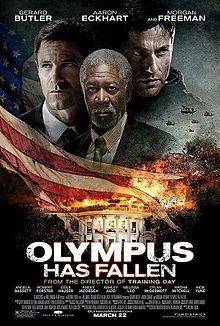 I'm not sure exactly what enticed me to watch
Olympus Has Fallen
, the movie about a terrorist attack on the White House (not to be confused with a similar movie,
White House Down
). But I put it on my Netflix queue and it bubbled to the top (well, being a new release, I put it at the top).
I'm not sure exactly what enticed me to watch
Olympus Has Fallen
, the movie about a terrorist attack on the White House (not to be confused with a similar movie,
White House Down
). But I put it on my Netflix queue and it bubbled to the top (well, being a new release, I put it at the top).I have to say, I enjoyed the movie. For a movie dealing with the President it wasn't overtly political (it did stray into Hollywood pabulum occasionally) and it was fun and exciting and people who didn't serve in the military probably didn't notice a bunch of stuff that wasn't very realistic. I did find it interesting that Morgan Freeman was cast as the Speaker of the House and a politician to the right of the President, at least on foreign policy.
Basically we have a bloody and violent popcorn movie. But it suffers a flaw (not exactly fatal in this case) that a lot of thriller movies (and books) have. That is, the climax (at the end of the movie) is not as exciting as the first act battle sequence that sets up the story. The taking down of the White House was a very well executed and exciting sequence early in the movie (if unrealistic, I thought). The climax (with a ticking clock, no less) was less so. But if you park your brain and enjoy the ride, it's a fairly fun film. The worst part was watching Lawrence O'Donnell try to act.
Published on August 17, 2013 12:52
August 14, 2013
More Freelancing Making Me Nervous
 I'm a wee bit nervous.
I'm a wee bit nervous. While I was on vacation I got an email asking me to do two freelance stories for the local paper (the editor actually tried to call but I was in a no-service area of Montana). Well, one thing led to another and it turned into three stories (all of which I found the subjects to interview and write about). Last year when I wrote for this publication, they asked for two 300-word stories. After trying to write them I asked if I could do more words and they said, "Sure." So they got two approximately 400-word stories. So this year I'm aiming at 400 words. I've already sent off two of them that were 423 and 501 words. So I'm already over the limit pretty significantly in one case (25% over).
But the second draft of the third story is currently at . . .787 words. I can kind of see pulling that back to 731 by taking out one paragraph that isn't desperately essential to the story. But even that I don't want to do. But I'm 97% over the limit! And, frankly, I don't want to make the story shorter because it's such a great story (because of the subject, not my writing). I'm going to, when satisfied with it, email it off and let the chips fall where they may.
So I'm a wee bit nervous.
Oh, and staring this afternoon I have another big story (1,000 words plus) to work on for another publication!
Published on August 14, 2013 11:42
August 12, 2013
Don't Want to Buy a New Printer
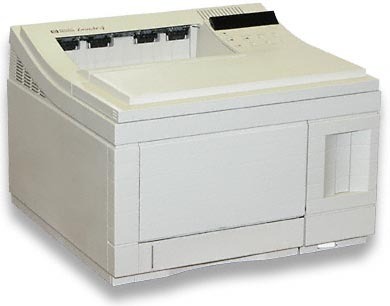 Back in about 1993(!) I bought a HP LaserJet 4 printer. I was in college at the time and I needed to print a lot of stuff. Plus, even then I had ambitions of being a writer (I was working on
Rock Killer
at the time) and figured I needed a good printer. I remember paying about $1,500 for it. My wife actually used some of her inheritance money to purchase it.
Back in about 1993(!) I bought a HP LaserJet 4 printer. I was in college at the time and I needed to print a lot of stuff. Plus, even then I had ambitions of being a writer (I was working on
Rock Killer
at the time) and figured I needed a good printer. I remember paying about $1,500 for it. My wife actually used some of her inheritance money to purchase it.At some point we put more memory in it because my wife was trying to print big graphic files with it and it just couldn't handle them. We were living in Vancouver, WA at the time and so that was before 1999. I remember it needed (expensive) Apple Mac RAM units.
So now it's 20 years later and that printer is . . . starting to jam. Badly. It'll jam on the first page and then the rest will accordion behind it (never knew an 8x11 sheet could be made that small). About a month ago I printed out a 400+ page manuscript and for the first time in its life it streaked about half the pages. So I ended up printing about 600 pages and it shot them all out in stride. Maybe that was the last straw because since then, it's been jamming.
So the question is, do I fix it or do I buy a new (color laser) printer. The problem I have is I believe most printer companies now sell what I call "disposable printers." They sell you a cheap, piece of crap printer for either very little profit or at a loss and make it up on ink and toner. I don't want a cheap printer, I want one that will last another 20 years and spit out paper reliably.
So tomorrow I'm taking it in to get fixed. I'm hoping that will solve the problem for another 10 years or so. But I'm also worried that, like an old car, it'll start nickel and diming me to death. Parts wear out, plastic gets old, rubber dries out. It might be time to move on. I just don't want to.
Published on August 12, 2013 13:05
August 9, 2013
Referrer Spam
I'm starting to hate what is called "referrer spam." Look at this screen capture of my stats from a couple of days ago (August 5th):

As you can see, something called "r-e-f-e-r-e-r.com" gave me 101 pageviews. That is referrer spam. In fact, of the four "entry" sources listed, the only one I know is not referrer spam is my own website.
On my old (paid) blog I never had referrer spam that I noticed. Yes, I'd have comment spam but even that was filtered out pretty well. It seems what the referrer spam people hope is you have on your blog your best referrers and then people who come to your blog will see that and click the link. And that sends them to a porn or scam or virus-installing website. The thing I hate about referrer spam is it distorts my pageviews so I have no idea who is really looking at my blog.
In an attempt to stop getting referrer spam, I have removed the pageview counter on this blog. Maybe their bots will see I don't post anything about pageviews or referrers and stop spamming me. Well, that's the hope (hasn't worked so far). You'd think the geniuses at Google would come up with a way to block it. But so far, no soap.
I guess it's just another annoyance of the internet these days.
UPDATE: I just noticed at the bottom of each blog post a "Links to this post" link. So I took that out and maybe that will solve the problem. I never realized that was there since it is in the Blogger default setup.

As you can see, something called "r-e-f-e-r-e-r.com" gave me 101 pageviews. That is referrer spam. In fact, of the four "entry" sources listed, the only one I know is not referrer spam is my own website.
On my old (paid) blog I never had referrer spam that I noticed. Yes, I'd have comment spam but even that was filtered out pretty well. It seems what the referrer spam people hope is you have on your blog your best referrers and then people who come to your blog will see that and click the link. And that sends them to a porn or scam or virus-installing website. The thing I hate about referrer spam is it distorts my pageviews so I have no idea who is really looking at my blog.
In an attempt to stop getting referrer spam, I have removed the pageview counter on this blog. Maybe their bots will see I don't post anything about pageviews or referrers and stop spamming me. Well, that's the hope (hasn't worked so far). You'd think the geniuses at Google would come up with a way to block it. But so far, no soap.
I guess it's just another annoyance of the internet these days.
UPDATE: I just noticed at the bottom of each blog post a "Links to this post" link. So I took that out and maybe that will solve the problem. I never realized that was there since it is in the Blogger default setup.
Published on August 09, 2013 11:37
August 8, 2013
An Adventure
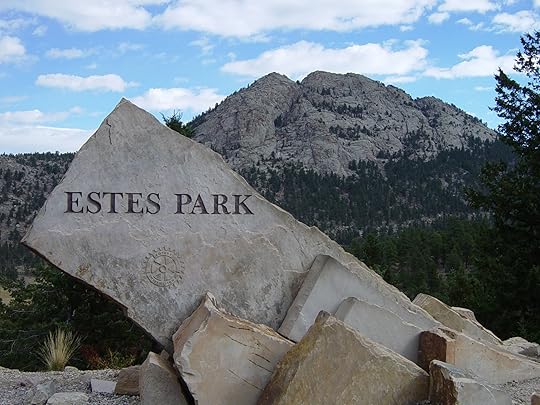 I'm home from my vacation/family reunion in Estes Park, Colorado. It was two days getting there, three days reunion, two days getting home. The trip home was pretty uneventful. The trip there was . . . an adventure.
I'm home from my vacation/family reunion in Estes Park, Colorado. It was two days getting there, three days reunion, two days getting home. The trip home was pretty uneventful. The trip there was . . . an adventure.But first some stats:
States traveled: Washington, Idaho, Montana, and Colorado
Miles traveled: getting there: 1,279; getting back: 1,204 for a total of 2,483 (The distance back is shorter because we took a more direct route and didn't have to turn around and go back).
Highest speed limit: 75 (most of Montana, Wyoming, and Colorado interstate). Lowest speed limit: 55: (Idaho on Lookout Pass just before the Montana border).
We left Thursday, August 1st, bright and early heading east on I-90. My mother was convoying with us and my youngest son rode with her. Lunch and fill the gas tank in Missoula, Montana and then back on the road, cruise control set at 80 (speed limit 75). After Butte, we started climbing over a pass (Homestake Pass, which is 6,329 feet) and it started raining . . .hard. Despite brand new tires on the car it hydroplaned a bit due to the amount of water on the road. We crossed the continental divide at the top of that pass and descended into a wide valley.
Ahead we could see black clouds and as we got closer, lightning weaving through the clouds. We got separated from my mother and son in Butte (they took the wrong turnoff) so they were about 10 miles behind us. We drove on into the storm and up another pass (Bozeman Pass at 5,702 feet). I wasn't too worried, what could it do other than rain hard like we'd just come through. Soon, lightning and thunder were constant as was heavy rain. One lightning bolt was very bright and the thunder followed almost immediately. Then we came to road construction and were limited to one slow-moving lane. I suddenly noticed there was some hail mixed with the rain. Then came more hail. The cars slowed to a stop just as it began hailing very hard. Soon the road was white with hail and I was afraid my car might be dented or a window crack. We sat and sat, listening to the hail pummel the car. I took a video during this:
Eventually the hail slowed down and was only raining. The line of vehicles started to move slowly. The road was completely covered with a hail/water slushy mixture and on-coming cars would splash that over our windshield blinding us until the wipers could take care of it.
As soon as we had cell service (it was spotty in many parts of Montana) we called the other car and told them to wait. We got to Bozeman (sunny, warm, but the smell of recent rain) and waited for them to catch up. I looked over the car and there didn't seem to be any sheet metal damage.
When my mother and son did arrive in Bozeman, they said they had no hail but rain. Dinner in Bozeman then on to Billings where I’d made motel reservations. This was about 650 miles into the trip. The next morning after the mandatory Starbucks stop, we headed out again. Just after I-90 split with I-94 (which continues east into North Dakota) and goes I-90 heads south, I tried to speed up to the 80mph I wanted to go but the car would not speed up and the RPMs would not go above 3000 no matter that I had the gas floored (the engine red lines at bout 5,400 RPM). So I pulled over and stopped and we could smell the hot transmission. When we drove to Starbucks I saw a Chrysler dealer so we turned around and limped back to Billings (it seemed to be working fine after sitting 10 minutes but didn’t want to be in the middle of nowhere Montana and have it go poof on us. The service department said they could look at it “after lunch” (this was about 9:00 in the morning). So they took us to a mall and we walked around then went back to the dealer, walked across the street for lunch. Then we decided my mom and the kids should go ahead and my wife and I would come when we could. The car’s “transmission communication wire” was not communicating so they replaced that and we left. We finally left Billings about 5:00 and caught up with mom and the kids in Casper, Wyoming (they stopped a long time for dinner) we got to Boulder around 1:00 A.M. We slept late and the next day headed to Estes Park for the family reunion.
The drive home was almost completely uneventful.
And that's our adventure.
Published on August 08, 2013 13:16
August 4, 2013
Vacation
I'm on vacation at a Townsend family reunion in Colorado. After two full days of driving (and car troubles in Billings, Montana, we arrived yesterday. It's beautiful here but the living conditions are a bit rustic. Also we're at 8,000 feet over sea level and just walking up a slight incline is an aerobic workout. We're at the "YMCA of the Rockies" but there's got to be 5,000 people here, too.
There's no AC in our room and you have to close the windows at night because of bears so last night we roasted. Today we're trying to cool off the room before we have to close the window.
Here's some pictures I've taken since arriving (I forgot my camera so these are all iPhone pictures):

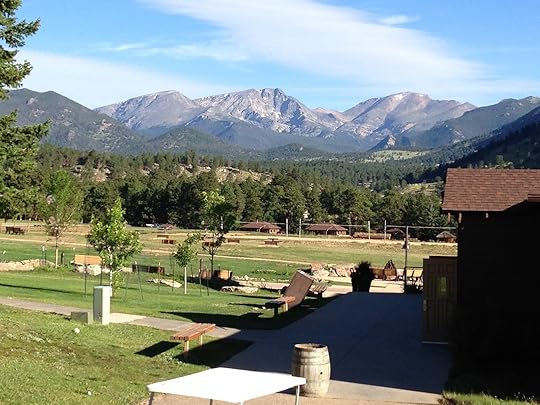

There's no AC in our room and you have to close the windows at night because of bears so last night we roasted. Today we're trying to cool off the room before we have to close the window.
Here's some pictures I've taken since arriving (I forgot my camera so these are all iPhone pictures):



Published on August 04, 2013 09:26



